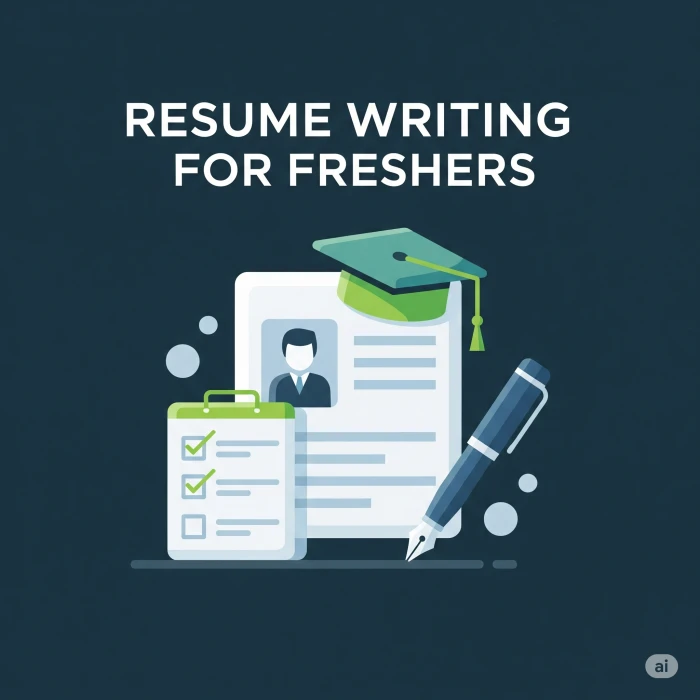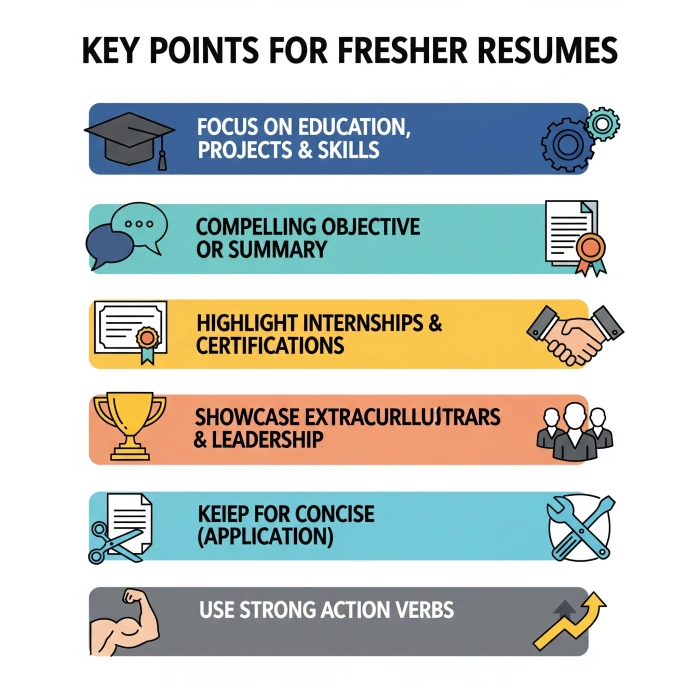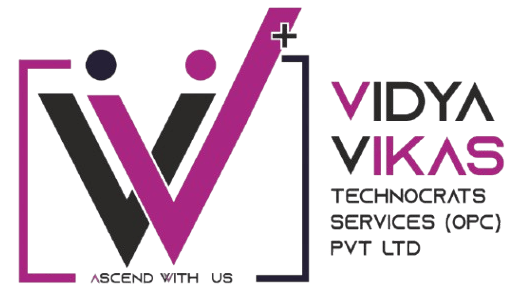EMPLOYABILITY & ENTREPRENEURSHIP
Admin VTECHNOCRATS
449

Key Points to Prepare Resume for Freshers
Preparing a resume as a fresher (someone with no prior professional work experience) can feel challenging, but it's an opportunity to showcase your potential, skills, and enthusiasm. The key is to highlight what you do have, rather than dwelling on what you don't.
Here are the key points to remember:
1. Focus on Education, Projects, and Skills
Since you don't have work experience, these sections become the most critical.
-
Education: This is your strongest asset.
-
Detailed Information: Include degree/diploma, university/college name, location, graduation year (expected or actual), and your GPA/percentage.
-
Relevant Coursework: List specific courses that are directly relevant to the job you're applying for, especially if they involved practical application or projects.
-
Academic Achievements: Include scholarships, Dean's List, top ranks, or academic awards.
-
-
Projects (Most Important for Fresher): This is where you demonstrate practical application of your skills.
-
Academic Projects: Final year projects, mini-projects, assignments that involved significant effort.
-
Personal Projects: Any hobby projects, open-source contributions, or personal initiatives that showcase relevant skills.
-
Structure for Each Project:
-
Project Title: Clear and concise.
-
Your Role: Briefly state what you did.
-
Technologies Used: List specific software, programming languages, tools.
-
Key Responsibilities/Actions: Use action verbs to describe what you did (e.g., "Developed," "Implemented," "Analyzed," "Designed").
-
Quantifiable Results/Impact: Whenever possible, quantify your achievements (e.g., "Improved efficiency by 15%", "Reduced error rate by 10%", "Managed a team of 3"). Even if small, show impact.
-
-
-
Skills: Categorize your skills clearly.
-
Technical Skills: Programming languages, software (AutoCAD, MS Office Suite, specific industry software), operating systems, databases, tools, analytical software.
-
Soft Skills: Communication, teamwork, problem-solving, leadership, adaptability, time management, critical thinking. Provide examples from projects or extracurriculars where you demonstrated these.
-
2. Craft a Compelling Objective or Summary
-
Career Objective (Traditional Fresher Resume): A concise, 1-2 sentence statement outlining your career aspirations and what you hope to contribute to the company. Tailor it to each job.
-
Example: "Highly motivated Civil Engineering Diploma holder with a strong understanding of AutoCAD and structural design principles, seeking an entry-level position at [Company Name] to apply learned skills and contribute to innovative infrastructure projects."
-
-
Professional Summary (Increasingly Preferred): A 2-3 sentence paragraph highlighting your strongest skills, relevant projects, and career aspirations. More impactful than a generic objective.
-
Example: "Enthusiastic and detail-oriented Civil Engineering Diploma graduate with hands-on experience in 2D and 3D AutoCAD drafting and project documentation. Proven ability in [mention a key skill, e.g., 'interpreting blueprints' or 'team collaboration through academic projects'], eager to contribute strong technical aptitude and a passion for sustainable design to a dynamic civil engineering firm."
-
3. Highlight Internships, Training, and Certifications
Even if they were short, unpaid, or part of your academic curriculum, they are valuable.
-
Internships: Treat them like mini-jobs. Include the organization, your role, dates, and bullet points describing your responsibilities and achievements using action verbs.
-
Vocational Training/Workshops: List relevant training programs or workshops attended (e.g., "AutoCAD Professional Training," "Site Surveying Workshop").
-
Certifications: Include any industry-recognized certifications (e.g., Autodesk Certified User/Professional, specific software certifications).
4. Showcase Extracurricular Activities and Leadership Roles
These demonstrate valuable soft skills.
-
Student Organizations/Clubs: Membership, leadership roles, events organized.
-
Volunteer Work: Shows initiative, teamwork, and commitment.
-
Sports/Hobbies: Can demonstrate discipline, teamwork, perseverance (if relevant to the role).
-
Focus on transferable skills: Did you manage a team for a college festival? That's leadership and project management. Did you organize a debate competition? That's communication and organization.
5. Keep it Concise (One Page Rule)
-
For freshers, a one-page resume is almost always ideal. Recruiters spend very little time on each resume, so make every word count.
-
Use concise bullet points. Avoid long paragraphs.
6. Formatting and Presentation Matters
-
Clean & Professional Layout: Use clear headings and sufficient white space. Avoid overly fancy designs or excessive colors.
-
Consistent Formatting: Maintain consistency in font sizes, bullet styles, and spacing throughout the resume.
-
Professional Fonts: Use easy-to-read fonts like Arial, Calibri, Times New Roman, or Lato.
-
Keywords: Scan the job description for keywords and incorporate them naturally into your resume. Many companies use Applicant Tracking Systems (ATS) that scan for these.
-
Proofread Meticulously: A single typo or grammatical error can create a poor impression. Get a friend or mentor to review it.
-
Save as PDF: Always send your resume as a PDF unless explicitly asked for a different format. This ensures the formatting remains consistent across different devices.
7. Tailor Your Resume for Each Application
-
Customize: Do not use a generic resume for every application. Read the job description carefully and tailor your objective/summary, projects, and skills to align with the specific requirements of that job.
-
Research the Company: Understand the company's values, projects, and culture. This can help you frame your achievements and aspirations in a way that resonates with them.
8. Use Strong Action Verbs
Start your bullet points with powerful action verbs that describe what you did.
-
Instead of "Responsible for..." use "Managed," "Developed," "Led," "Designed," "Analyzed," "Implemented," "Created," "Researched," "Collaborated."
By focusing on these key points, a fresher can create a compelling resume that effectively showcases their potential and readiness for the professional world.
